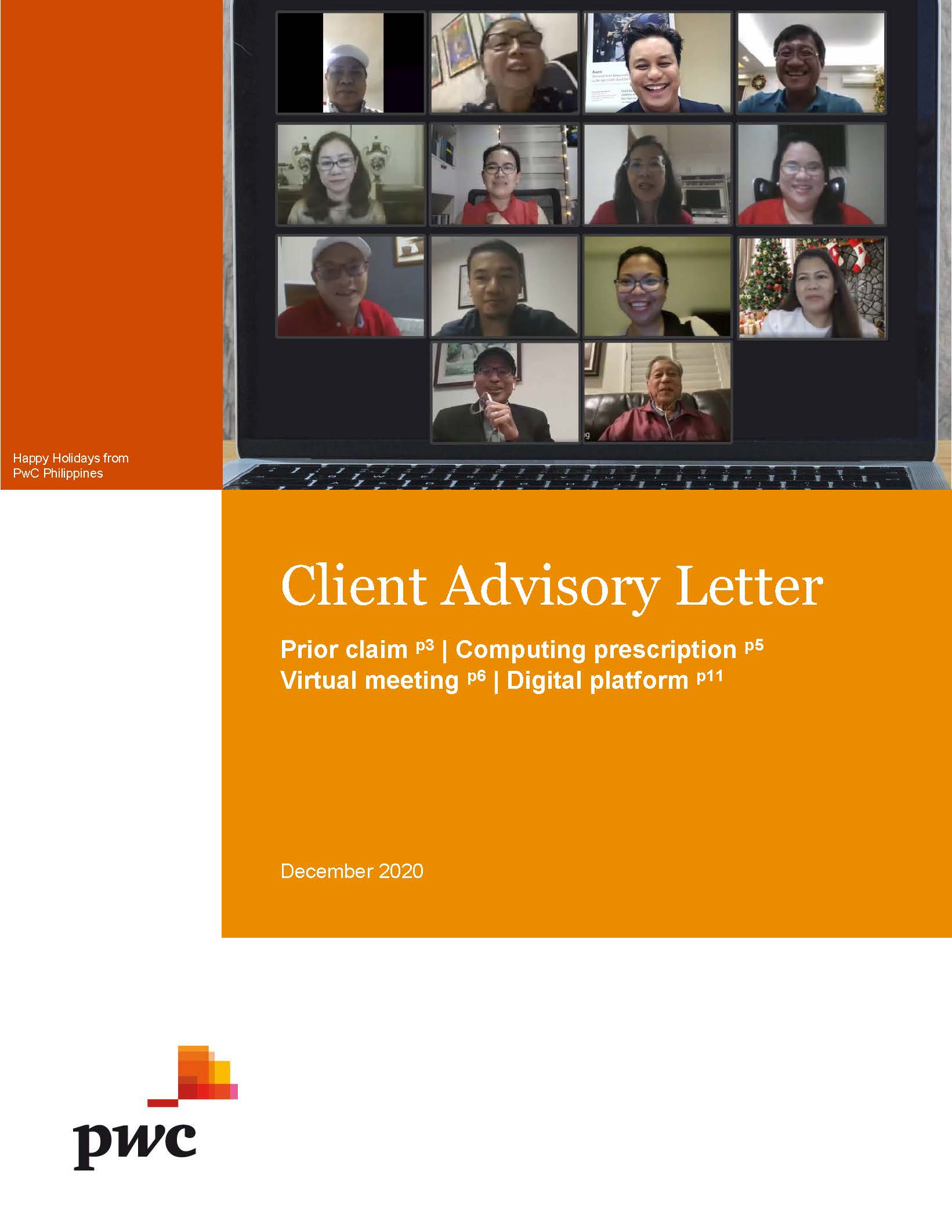

This is a publication about developments in Philippine taxation. The contents usually include latest Republic Acts, Bureau of Internal Revenue issuances, Customs regulations, Court decisions, BSP circulars, SEC circulars, Department of Justice opinions and Executive Orders relevant to Tax practice.
Talk to us
For further discussion on the contents of this issue of the Client Advisory Letter, please contact any of our partners.
Request for copies of text
You may ask for the full text of the Client Advisory Letter by writing our Tax Department, Isla Lipana & Co., 29th Floor, Philamlife Tower, 8767 Paseo de Roxas, 1226 Makati City, Philippines. T: +63 (2) 8845 2728. F: +63 (2) 8845 2806.
Private rulings
Whether a taxpayer can invoke tax rulings obtained by other taxpayers
Revenue Memorandum Order No. 9-2014 provides that a BIR ruling is based on particular facts and circumstances presented by a taxpayer and are interpretations of law at a specific point in time. These cannot be cited as precedent by other taxpayers although they can provide useful information on how the BIR may treat similar positions.
In this light, the CTA held that a taxpayer, who was justifying a refund claim, cannot invoke BIR rulings that were issued to other persons since said rulings can be invoked only by the taxpayers who sought or requested the same.
(CTA EB No. 2087, promulgated 14 December 2020)
Prior claim
Consequence of filing both administrative and judicial refund claims on the same day
On 22 August 2016, a taxpayer filed with the BIR an administrative claim for refund of excise taxes. Subsequently, but on the same day, the judicial claim was filed with the CTA.
The CTA denied the judicial claim for failure of the taxpayer-claimant to comply with the requirement of prior filing of the administrative claim. According to the CTA, even if the administrative claim was filed before the filing of the judicial claim, both filings were done on the same day.
It was held that the filing of both administrative and judicial claims on the same day does not comply with the requirement of prior filing under Section 229 of the Tax Code and that such same-day filings are akin to the concurrent filing of the subject claims which fall short of the primary purpose of giving the Commissioner of Internal Revenue an opportunity to act on the administrative claim.
Citing a Supreme Court decision, the CTA explained that the primary purpose of requiring the prior filing of an administrative claim was to give notice or warning to the CIR that court action would follow unless the tax alleged to have been erroneously or illegally collected is refunded.
(CTA EB No. 2166, promulgated 11 December 2020)
Reasonable expectation
Effect of BIR’s failure to state reasons for rejecting taxpayer explanations
Section 228 of the Tax Code requires that taxpayers shall be informed in writing of the law and the facts on which tax assessments are made. Otherwise, such assessments shall be void.
According to the CTA, as a corollary to the above requirement, the taxpayer must not be left unaware on how the CIR or his duly authorized representatives appreciated the explanations or defenses raised in connection with the assessment.
Hence, the CTA ruled that when the Formal Letter of Demand and Final Assessment Notices (FLD/FAN) merely reiterates the same findings as those stated in the Preliminary Assessment Notice (PAN) without giving any reason for rejecting the refutations and explanations made by the taxpayer in response to the PAN, the BIR is deemed not to have given the particular facts upon which the tax assessments in the FLD/FAN were based. This constitutes violation of the taxpayer’s right to due process which renders the tax assessment void.
In support of its decision, the CTA cited a Supreme Court case wherein it was held that although the CIR is not obliged to accept the taxpayer's explanations, if such explanations are rejected, the CIR must give some reason for doing so. In this regard, the CIR must give the particular facts upon which his or her conclusion are based, and those facts must appear in the record.
(CTA Case No. 9758, promulgated 3 December 2020)
Transfer pricing limit
Only specific taxpayers are now required to submit BIR Form No. 1709
Revenue Regulations (RR) No. 19-2020 and Revenue Memorandum Circular No. 76-2020 regarding the submission of BIR Form No. 1709 (the “RPT Form”) and transfer pricing documentation (TPD) have been amended as follows:
Only the following are required to file the RPT Form together with the annual income tax return (ITR):
Large Taxpayers;
Taxpayers enjoying tax incentives,
e.g., taxpayers registered with the Board of Investments and with economic zone authorities;Taxpayers reporting net operating losses for the current taxable year and the immediately preceding two consecutive taxable years; and
Related parties, as defined by Section 3 of RR No. 19-2020, who have transactions with taxpayers in Subsections 1, 2 or 3 above.
Key management personnel (KMP) shall no longer be required to file the RPT Form. Further, there shall be no requirement to report any transaction between KMP and the reporting entity/parent of the KMP in the RPT Form.
When short-period annual ITRs are required, the RPT Form shall still be accomplished in all cases. However, compliance therewith shall only be mandatory for short-period returns filed in 2021 and subsequent years.
The preparation and submission of TPD under RR No. 2-2013 shall be mandatory for the above-enumerated taxpayers who meet the following materiality thresholds:
Annual gross sales/revenue for the subject taxable period exceeding PHP150m and total amount of related party transactions exceeds PHP90m
In computing the threshold for related party transactions, the following shall be included:
Amounts received and/or receivable from related parties, or amounts paid and/or payable to related parties but excluding compensation paid to KMP, dividends and branch profit remittances; and
Outstanding balances of loans and non-trade amounts due from/to all related parties.
Related party transactions meeting any of the following materiality thresholds:
If involving sale of tangible goods in an aggregate amount exceeding PHP60m within the taxable year; or
If involving service transaction, payment of interest, utilization of intangible goods or other related party transaction in an aggregate amount exceeding PHP15m within the taxable year.
If TPD was required to be prepared during the immediately preceding year for exceeding the materiality thresholds under Subsections 1 or 2 above.
The TPD and other supporting documents set out in Section 6 of RR No. 19-2020 shall no longer be attached to the RPT Form. However, the same shall be submitted within 30 calendar days upon request by the BIR pursuant to a Letter of Authority, subject to a non-extendible period of 30 calendar days based on meritorious grounds.
In addition to the requirements under RR No. 21-2002, taxpayers who are not covered by Section A above are required to disclose in the Notes to the Financial Statements that they are not covered by the requirements and procedures for related party transactions under RR No. 34-2020.
The simplified version of the RPT Form shall be used in lieu of the old form.
(Revenue Regulations No. 34-2020, published 23 December 2020)
VAPP extension
Amending the Voluntary Assessment and Payment Program regulations
Revenue Regulations (RR) No. 21-2020, which implements the Voluntary Assessment and Payment Program (VAPP) covering taxable year 2018, has been amended as follows:
The period for availment of the VAPP has been extended to 30 June 2021.
Taxpayers who availed of the VAPP on withholding taxes shall be allowed to deduct the corresponding income payments pursuant to RR No. 6-2018.
Any Notice of Discrepancy previously issued shall be withdrawn and cancelled after a Certificate of Availment (CA) is issued.
Despite the issuance of a CA, the taxpayer’s availment shall be rendered invalid and shall be subject to audit when there is strong evidence or findings of under-declaration of sales, receipts or income, or overstatement of deductions by more than 30% based on a written report of the appropriate revenue official stating the facts with supporting documents such as Discrepancy Notice and other third party information documents.
The denial of the VAPP application or the invalidation of a previously issued CA shall be valid only if the taxpayer is formally notified by the Division Chief (Large Taxpayers Office) or by the Revenue District Officer where the taxpayer is registered, stating the factual reasons therefor.
The above denial or invalidation may be appealed to the Assistant Commissioner – Large Taxpayers Service or to the Regional Director within 30 days from receipt of the notice.
(Revenue Regulations No. 33-2020, published 22 December 2020)
Amnesty extension
New deadline for availing the tax amnesty on delinquencies to 30 June 2021
The deadline for availing the tax amnesty on delinquencies for taxable year 2017 and prior years under Republic Act No. 11213 has been moved to
30 June 2021.
(Revenue Regulations No. 32-2020, published 22 December 2020)
Computing prescription
Clarifying the determination of the new prescriptive dates
In Revenue Regulations No. 11-2020, the BIR suspended the running of the prescriptive periods of the right to assess and collect taxes starting from 16 March 2020 until sixty days after the lifting of the quarantine. Accordingly, the three-year and five-year prescriptive periods shall exclude a total of one hundred thirty-seven (137) days.
To clarify how to determine the new prescriptive dates, the BIR has provided the following illustration:
Original Prescriptive Date |
New Prescriptive Date |
|
Case 1 |
15 March 2020 |
15 March 2020 |
Case 2 |
16 March 2020 |
31 July 2020 |
Case 3 |
15 April 2020 |
30 August 2020 |
Case 4 |
15 June 2020 |
30 October 2020 |
Case 5 |
15 July 2020 |
29 November 2020 |
Case 6 |
15 April 2021 |
30 August 2021 |
(Revenue Memorandum Circular No. 136-2020, issued 17 December 2020)
Climate change
Paying taxes in case of unavailability of the eFPS during the typhoons
Due to the inaccessibility of the Electronic Filing and Payment System (eFPS) between 10 to 14 November 2020 due Typhoons Rolly and Ulysess, the filing of withholding tax returns (BIR Form Nos. 1600, 1601-C, 0619-E and 0619-F) and corresponding remittance of withholding taxes by eFPS taxpayers for the month of October 2020 are allowed until the close of banking hours on 20 November 2020, without the imposition of penalties for late payment. This extension of payment is applicable only to eFPS taxpayers with activated epayment accounts with Authorized Agent Banks (AABs).
In case the eFPS facility is not yet accessible, eFPS filers are temporarily allowed to manually file their tax returns and pay taxes through the following:
Land Bank of the Philippines (LBP) Link.biz Portal - for taxpayers who have ATM accounts with LBP and/or holders of BancNet ATM/Debit/Prepaid Card, and taxpayers utilizing PesoNet facility (depositors of RCBC, Robinsons Bank and Union Bank)
Development Bank of the Philippines Pay Tax Online - for holders of Visa/Mastercard Credit Card and/or BancNet ATM/Debit Card
Union Bank Online Web and Mobile Payment Facility - for taxpayers who have accounts with Union Bank
Mobile payment (GCash/PayMaya)
eFPS and eBIRForms filers affected by Typhoons Rolly and Ulysses who are registered under the following areas where power supply or telecommunications connectivity have been disconnected are temporarily allowed to file their tax returns and pay taxes without imposition of penalties for late payment:
Bicol Region
CALABARZON
MIMAROPA
Cagayan Province, including Tuguegarao City
Isabela Province
Aurora Province
Marikina City
Concerned taxpayers are given a 15-day extension on deadlines falling between 15 and 30 November 2020. Filing and payment may be made with AABs or with Revenue Collection Officers, in areas with no AABs. Taxes may also be paid through GCash or PayMaya.
(Revenue Memorandum Circular No. 133-2020, issued 11 December 2020)
Form of beauty
Prescribing the new excise tax return for cosmetic procedures
The new BIR Form No. 2200-C (Excise Tax Return for Cosmetic Procedures) is already available in the BIR website under the BIR Forms - Excise Tax Section. However, it is not yet available in the Electronic Filing and Payment System (eFPS) and Electronic BIR Forms (eBIRForms). Hence, eFPS and eBIRForms filers shall continue to use BIR Form No. 0605 in filing and paying the excise tax due.
The deadline for filing and paying the excise tax is within ten days after the close of the month. If no invasive cosmetic procedure was performed which does not give rise to excise tax, BIR Form No. 2200-C should still be filed.
In light of the foregoing, all AABs are advised to accept said BIR Form No. 2200C and follow the procedures in Bank Bulletin No. 2018-01 for the updating of the BIR Form in the Forms Code under the Limited Bank Data Entry System or AAB payment system authorized by the BIR.
(Revenue Memorandum Circular No. 132-2020, issued 11 December 2020 and Bank Bulletin No. 17-2020, issued 24 November 2020)
Virtual meeting
Guidance for online meetings between the BIR and taxpayers
BIR officers/employees and taxpayers may use digital or online media as alternative options to hold meetings. In order to ensure the order, uniformity and integrity of information during the conduct of such online meetings, the following guidelines and policies should be observed:
Online meetings with taxpayers or taxpayers’ representatives shall be hosted by the BIR.
BIR officials/employees shall only use prescribed BIR email addresses when sending invitations for online meetings.
All online meetings must be pre-approved in writing by the concerned Division Chief for the National Office, Regional Director for Regional Offices and Revenue District Officer for Revenue District Offices.
A taxpayer’s representative shall have duly notarized Special Power of Attorney from the taxpayer, those already with BIR Certificate of Accreditations.
Online meetings shall be conducted only if the taxpayer or taxpayer’s representative requested a virtual meeting schedule via the BIR eAppointment System and clicked “Agree” to the BIR eAPPOINTMENT USER AGREEMENT, or submitted a duly accomplished BIR VIRTUAL MEETING AGREEMENT, for BIR offices with no BIR eAppointment System facility.
Proceedings during online meetings shall be strictly confidential. Hence, recording is strictly prohibited.
(Revenue Memorandum Circular No. 130-2020, issued 10 December 2020)
Vaping rules
Joint implementing rules and regulations for heated tobacco and vapor products
The Department of Health (DOH), Department of Finance (DOF), Department of Budget and Management, Bureau of Internal Revenue (BIR) and Philippine Health Insurance Corporation issued Joint Memorandum Circular No. 3-2020 containing the implementing rules and regulations (IRR) of heated tobacco products and vapor products as prescribed by RA Nos. 11346 and 11467.
The tax features of the IRR include the following:
The BIR shall mandate the proper affixture of internal revenue tax stamps and ensure that stamp taxes are not affixed on Non-Compliant Packages
The BIR shall ensure that packaging approved per the Tax Code are compliant with the Graphic Health Warnings Law.
The DOF, upon BIR recommendation, shall issue the necessary regulations and guidelines prescribing the floor price or minimum price of Vapor Products and Heated Tobacco Products, considering the sum of the excise tax and VAT as provided in Republic Act No. 11467.
(Revenue Memorandum Circular No. 128-2020, issued 7 December 2020)
Holiday break
Suspension of all audit and field operations of the Bureau of Internal Revenue
The Commissioner of Internal Revenue (CIR) suspended all BIR audit and field operations from
15 December 2020 to 7 January 2021. Hence, the BIR shall not conduct field audit, field operations or any business visitations pursuant to Letters of Authority/Audit Notices or Mission Orders.
Further, no written orders to audit shall be served except in the following cases:
Investigation of cases prescribing on or before
15 April 2021;Tax evasion cases;
Processing and verification of estate tax returns, donor’s tax returns, capital gains tax returns and withholding tax returns on the sale of real properties or shares of stocks together with related documentary stamp tax returns;
Examination and/or verification of taxes of taxpayers retiring from business;
Monitoring of privilege stores (tiangge); and
Other matters where deadlines have been imposed or under the orders of the CIR.
To ensure maximum revenue collection, Notices to Avail the Tax Amnesty on Delinquencies, Estate Tax Amnesty and the Voluntary Assessment and Payment Program should still be served.
(Revenue Memorandum Circular No. 127-2020, issued 4 December 2020)
Withholding from compensation
Availability of BIR Form No. 1601-C in the Electronic Filing and Payment System
BIR Form No. 1601-C (Monthly Remittance Return of Income Taxes Withheld on Compensation) is already available in the Electronic Filing and Payment System (eFPS). This shall be used by withholding agents/payors who are eFPS filers in remitting withholding taxes on compensation in accordance with their business industry grouping.
(Revenue Memorandum Circular No. 125-2020, issued 27 November 2020)
Offshore income
Revised requirements and procedures for Tax Residency Certificate applications
The Commissioner of Internal Revenue amended Revenue Memorandum Order (RMO) No. 51-2019, revising the documentary requirements for Tax Residency Certificate (TRC) applications as follows:
For individuals
Duly accomplished BIR Form No. 0902;
Certified true copy of the following:
Contract duly signed by both parties or any competent proof of transaction;
BIR-registered invoice/receipt issued by the taxpayer to the income payor and relevant Authority to Print or Permit to Use Computerized Accounting System/Loose-Leaf Receipts/Invoices; and
Proof or remittance if income was already received;
Photocopy of passport booklet of Residency Certificate issued by the Barangay Chairman if the applicant never left the Philippines;
Annual income tax return for the immediately preceding year; and
Notarized Special Power of Attorney (SPA) or authorization letter in favor of an authorized representative expressly stating the authority to sign BIR Form No. 0902 and to file the TRC application.
For non-individuals
Duly accomplished BIR Form No. 0902
Proof of establishment in the Philippines;
Certified true copy of the following:
Contract duly signed by both parties or any competent proof of transaction;
BIR-registered invoice/receipt issued by the taxpayer to the income payor and relevant Authority to Print or Permit to Use Computerized Accounting System/Loose-Leaf Receipts/Invoices; and
Proof or remittance if income was already received.
List of partners if the applicant is a general professional partnership;
Annual income tax return for the immediately preceding year; and
Notarized SPA or authorization letter in favor of an authorized representative expressly stating the authority to sign BIR Form No. 0902 and to file the TRC application.
The following should also be noted:
The duly accomplished BIR Form No. 1902 submitted shall be in lieu of the previously required letter-request.
The assigned case officer shall inform the applicant of any deficiency in the requirements within three working days via registered mail or email.
All TRC applications shall be acted upon within fourteen working days from the submission of complete documentary requirements.
The BIR shall continue to issue its own TRC Form which shall be signed by the Assistant Commissioner for Legal Service.
When a taxpayer fails to secure a TRC and pays income taxes in a foreign country, such foreign income taxes paid may be credited against Philippine income taxes.
However, RMO No. 46-2021 provides that in such case, the tax auditor shall not allow as foreign tax credit the taxes paid in the foreign country but shall instead advise the taxpayer to secure a TRC and file a claim for tax refund in the foreign country.
(Revenue Memorandum Order No. 43-2020, issued 1 December 2020)
Embassy privilege
VAT refund claims of resident foreign missions and qualified personnel
The Commissioner of Internal Revenue clarified the policies and procedures for VAT refund claims of the following:
Resident foreign missions (RFMs), their qualified personnel including the personnel’s qualified dependents whose VAT privileges were transitioned from point-of-sale VAT exemption into VAT refund; and
RFMs, their qualified personnel including the personnel’s qualified dependents who were granted point-of-sale VAT exemption but were not accorded such privilege by the transacting business establishments.
The policies and procedures include the following:
All business establishments are directed to honor and recognize the VAT Certificate or VAT Identification Card issued by the BIR to the RFMs, their qualified personnel and the personnel’s dependents when presented at the point of sale, irrespective of whether the purchase was made online.
Invoicing for VAT refund purposes
Since RFMs, their qualified personnel and the personnel’s dependents are not VAT-registered taxpayers, the VAT invoice/official receipt that must be presented when claiming VAT refunds need not contain the name, address and TIN of the purchaser.
Tape receipts/invoices issued by business establishments reflecting the claimant’s name using membership/loyalty cards would be considered as sufficient evidence.
For credit transactions, tape receipts/invoices generated from BIR-registered Cash Register Machines/Point-of-Sale Machines (CRM/POS Machines) incapable of encoding the purchaser’s information would suffice, provided the transaction is supported by a credit card slip and statement of account.
For cash transactions where the CRM/POS Machines are incapable of encoding the purchaser’s information, business establishments shall issue a manual receipt bearing the purchaser’s information.
For online transactions, the claimant must likewise secure the same receipts as discussed above. The claimant is hereby advised not to transact with business establishments that cannot issue BIR-registered receipts/invoices.
Documentary requirements for VAT refund applications
The usual procedures for the processing of VAT refund claims of VAT-registered taxpayers shall not apply to the RFMs, their qualified personnel and the personnel’s dependents because of their unique situation. The applicable procedures are provided under Revenue Memorandum Order No. 41-2020.
(Revenue Memorandum Order No. 41-2020, issued 1 December 2020)

















